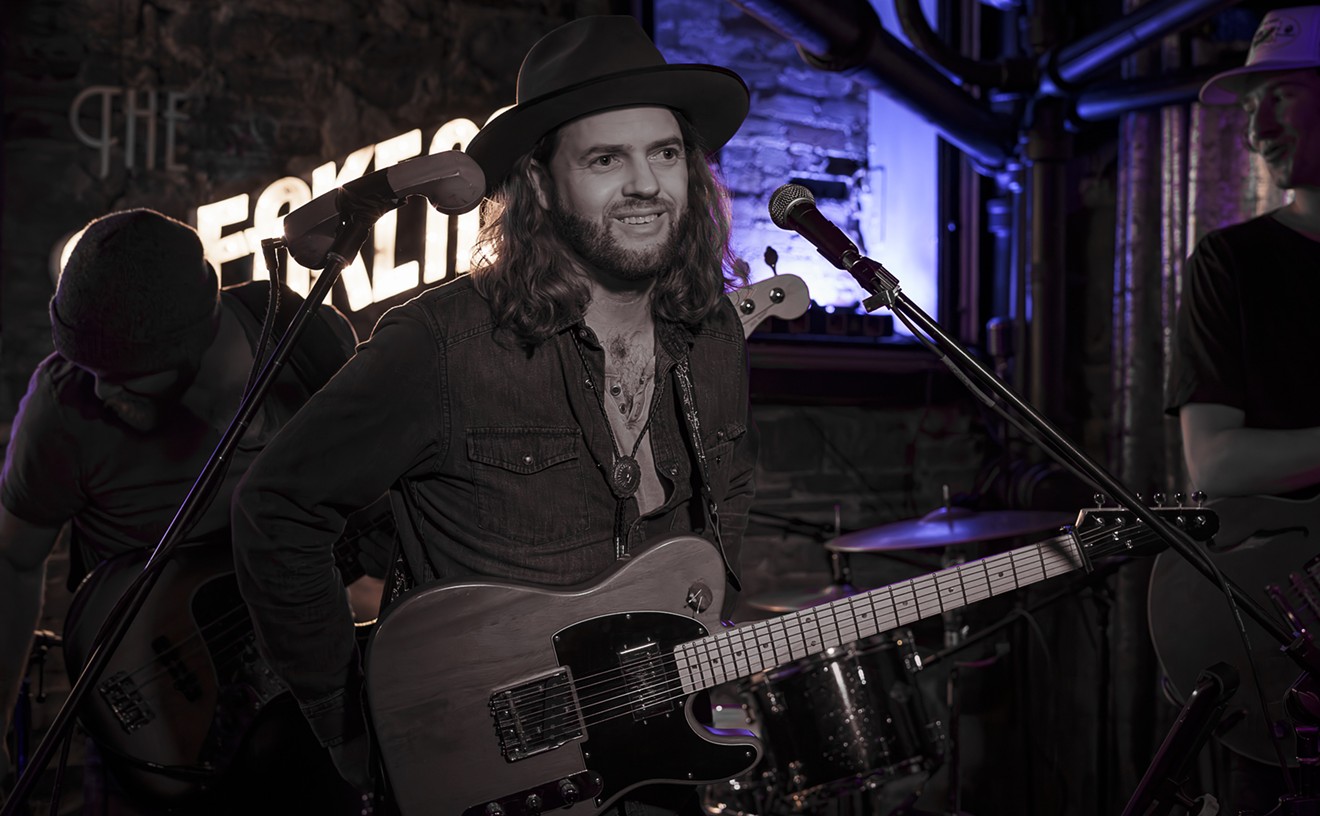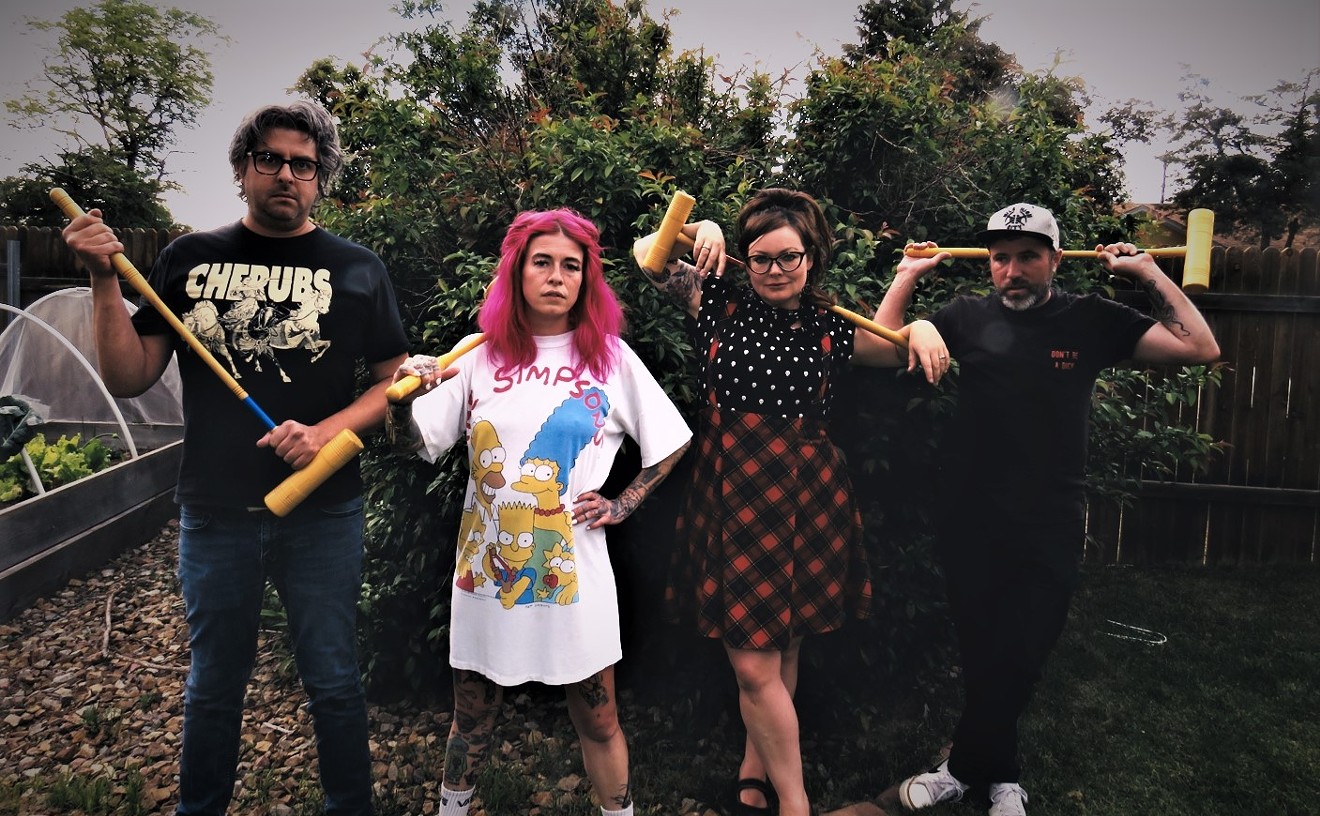Soundgarden formed in 1984 as a three-piece with Chris Cornell on drums on vocals, Kim Thayil on guitar and Hiro Yamamoto on bass. Though noisier in the beginning, the band would go on to be one of the main purveyors of a slow, sludgy, intense, punk-rooted rock that was dubbed "grunge" by the British press. Though that label was slapped on anything that came out of Seattle, Soundgarden was more psychedelic than many of its peers.
See also: - Tuesday: Soundgarden at 1STBANK Center, 5/28/13 - Soundgarden's Matt Cameron on the band's reunion - Review: Soundgarden at Red Rocks, 7/18/11
Soundgarden was one of the earliest of the Sub Pop bands to sign with major label A&M for its 1989 album, the darkly and electrifyingly harrowing Louder Than Love, which was originally sold as metal. But the metalheads that bought the record under those auspices discovered a band far more strange musically than most metal with deeply poetic lyrics about truly dark subjects that most heavy bands of the era weren't touching and today still don't much.
The band broke to a mainstream audience around the time grunge became a nationwide phenomenon with the release of its 1991 album Badmotorfinger. These guys never got quite as big as say Nirvana or Pearl Jam, but they also never released a subpar record. We recently spoke with the good-humored and frank Ben Shepherd about his direct ties with Nirvana, the mis-ordering of footage for "Crooked Steps" and how playing bass is like playing a song within a song.
Westword: You were born in Okinawa. Was your dad in the service?
Ben Shepherd: Yeah, he was a Nike missile guy. I just only realized lately, in the last year, that my family had lived there for a few years, and then I was born, and a few months after that, we moved to Texas. I was born on the base, and it was during the worst typhoon in eighty years, which changed my name because my dad was going to name me Stormy after his first horse. This one really mean-ass horse he had. He was a cowboy growing up. Still is. Of course when the storm hit he said, "That's too corny; can't name him that now."
After your family moved to Washington State, how did you get involved in punk. It seems as though you got into that at a very early age?
Oh, yeah, definitely. My older brother figured all that stuff out. We were way ahead of the game with most music because of him. He just stayed in touch with the outside world somehow, which was funkarello because that part of the world is totally podunk, boondock land out where I grew up. But somehow Henry, my older brother, was ahead of the game on music. We were more hip to music than the city kids were. We were way ahead of them.
Did you get to see some early punk shows in Seattle?
No, I started going to shows in the '80s, like 1980 on. I was really young.
Did you get to see the Blackouts?
No, my brother Henry and all his friends saw the Blackouts, and then they moved out to the East Coast and never came back by the time I was going to see shows. They were the band of Seattle. "Whoa, that's our band!" You know? Then the U-Men took over that slot, and then all the other guys, like Soundgarden and everyone else showed up.
Obviously you saw Soundgarden early on?
Yeah, I saw some of their first shows at this place called Gorilla Gardens. They were opening for Hüsker Dü and somebody else. They blew everyone off the stage though they were a three-piece.
When you started doing bands of your own, what did you play?
I played guitar. I always wanted to play guitar. My dad, on the Army base in El Paso, he would play guitar before work, and I would put my ear on the guitar, and it distorted -- which I liked the sound of better. I'd be shining his boots, and he'd be playing guitar, and I'd put my ear on the guitar and thought it sounded cool. He was playing Johnny Cash and Hank Williams stuff and Creedence Clearwater Revival.
How did you become a roadie for Nirvana?
Well, I was supposed to play lead guitar for them. But they stayed a three piece. I knew them before they were a band, too. Chad [Channing] never told Kurt [Cobain] that I played guitar, even though the first time Kurt and I met, we were at a party in Olympia, and we were the two loners on the end of the couch, and there was a guitar there. I would always find a guitar at a party because I didn't like parties much. So I would find the guitar and space off by myself, you know? Kurt was the same way, so we wound up sharing a guitar that night, an acoustic that was there.
Then our paths went different ways. Chad, my old friend, we were in a band together, and I was the singer for a band. Then there was Krist Novoselic walking up to me. This was after my punk band, March of Crimes, broke up, and I was in this band called the Magnet Men. Then I went, "That's a dumb name, let's change it." When we were playing, we played with Malfunkshun and this band called Bliss -- Krist Novoselic's band.
I'd already known him from playing in March of Crimes, and growing up, you had to have a brother band to play gigs with you. We played down in Portland, and we got Bliss on the bill, or they got us, and we stayed with the Melvins. We'd run into Krist there because they were part of the same crowd out in Montesano or Aberdeen.
When we played with this band a couple of years later or something, there was Krist who said, "Hey, Ben, dude, do you think your drummer would let us use his drum set?" "Fuck, I didn't know you were in a band, Krist, cool. Sure, man. That's Chad up there. He has those funny looking drums up there. He'll probably loan you those drums."
So they did, and that's how they met Chad, and he ended up joining the band. I didn't really roadie with them. I just went on tour with them. We all did all that shit. It was a blast to get out. The furthest East we made it was Ann Arbor; then we went back to play Cincinnati and stuff and played Denver -- 23 Parish had just opened, and I remember hanging out with the owners of the place and talking to them about it.
Continue reading for more from Shepherd.
Maybe this was a kind of joke or an exaggeration of some kind, but in an interview you did with Spin three years ago, it sounded like you were totally broke and sleeping on friends' couches.
No, I was sleeping on couches in studios when I was recording my solo album. But instead of spending ferry money to go home where I would be doing nothing, I decided to stay in the city and do stuff. So it wasn't like I was homeless and couch surfing.
That video for "Crooked Steps" is fairly amusing.
Yeah, I think that reveal of us being on the Segways is in the absolutely wrong spot, but it was sold to us as an idea. It's supposed to be later on in the video that we're on Segways, but right away in the video, it gives that away. What? It's supposed to be when we're getting chased by cops that you realize we're on Segways. Not right away. That kind of ruined the whole joke to me.
What was the concept behind the video? Was that something you developed?
No, that was Dave Grohl. We all thought it was hilarious, but I thought it was for a different song. I had "Crooked Steps" mixed up with "Worst Dreams." I thought, "How the hell is this funny?"
Did you approach Dave to do the video?
He approached us, or he talked to Matt [Cameron], and he ran it by us all. I stayed away from it all.
You've worked with Matt on more than just Soundgarden. What do you appreciate about playing with him?
He makes everything easy as hell. You can mess up as much as you want, and it's still on. He's really creative, and he knows the references I talk about, whether that's music or ideas. He's well-read in music and literature. Plus he's a good friend, and I can relate to him. Other people I can't really relate to as much.
You've written songs for the band over the years. On King Animal, you wrote both the words and the music for "Attrition." What can you tell us about that song?
I wrote that the day that we started to raid Iraq. It was a commentary on the world around us, you know?
You started out as a guitarist, and you play bass in Soundgarden. What do you like about each, and how do you approach them differently? It can be a different mentality for both.
Nah, it really isn't. I don't know how to describe it. I just realized that my memory is so bad now that it isn't worth memorizing anything. It's like when I read a book, I have to start over all the time. No, I'm only kidding. Guitar I always approach as if it's a horn section. There's a horn section of guitar that does the rhythm. There's a horn section that does the lead.
Bass is more fluid. I like to play the bass along to the vocals, but I didn't get to do that on [King Animal]. It helps to harmonize. With bass, you're a lot more free to do stuff because it's a song within a song. The guitar is so blatantly up front, and that's the song. I'd rather go back and re-record everything as a song-within-a-song. There wasn't time for that during the recording.
Were you able to express that concern to the rest of the band for the next record?
No. And it depends on the next record and the next set of songs. Each song and each record is completely individual anyway. There's no goddamned formula we stick to. Except for me. Just go buy the cheapest bass off the wall there is. That's because that's what a normal kid could get. That's what they can afford, so that's the way it should be.
Follow @Westword_Music











